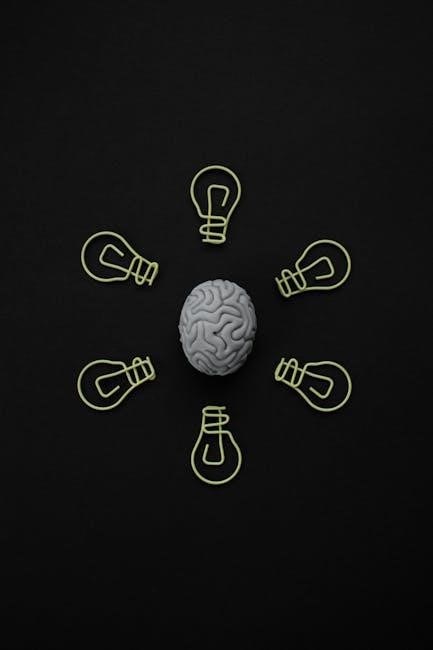
The 7th edition of Psychological Science offers a comprehensive update on modern psychology, incorporating cutting-edge research and interactive tools to enhance learning and understanding.
Overview of the 7th Edition
The 7th edition of Psychological Science represents a significant update in the field, offering a balanced blend of foundational principles and cutting-edge research. It emphasizes the scientific method in psychology, providing students with a robust understanding of behavioral studies, cognitive processes, and social influences. This edition incorporates new topics such as advancements in neuroscience and the impact of technology on human behavior. Interactive digital tools and real-world applications enhance learning, making it accessible for both students and educators. The text also highlights ethical considerations and modern methodologies, ensuring a comprehensive and engaging exploration of psychological science. Its structured approach and updated content make it a valuable resource for understanding the complexities of human behavior and mental processes.
Key Features of the Textbook
The 7th edition of Psychological Science is distinguished by its engaging and evidence-based approach, offering interactive digital tools and real-world applications to deepen understanding. It includes updated research findings, ensuring students access the latest advancements in the field. The textbook features clear chapter organization, with concise sections and visual aids to enhance comprehension. Additionally, it incorporates ethically diverse perspectives, addressing the complexities of psychological research. The integration of study aids, such as flashcards and quizzes, supports active learning. This edition also emphasizes critical thinking skills, encouraging students to analyze and evaluate psychological concepts effectively. Its comprehensive and accessible design makes it an essential resource for both beginners and advanced learners in psychological science.

Importance of Studying Psychological Science
Studying psychological science provides a foundational understanding of human behavior, mental processes, and social interactions. It equips students with insights into cognitive functions, emotional regulation, and behavioral patterns, enabling them to navigate real-world challenges effectively. Psychological science fosters critical thinking and problem-solving skills, which are invaluable in various professions. By exploring topics like development, motivation, and social dynamics, learners gain a deeper appreciation of diversity and ethical considerations. This knowledge is crucial for addressing mental health issues, improving decision-making, and enhancing interpersonal relationships. Moreover, it prepares individuals to contribute to research and applied fields, making it a vital discipline for understanding humanity. The 7th edition PDF serves as a key resource for this enriching journey into psychological science.

Structure and Content of the 7th Edition

The 7th edition is organized into clear chapters, providing a logical progression through psychological concepts, theories, and applications, with enhanced visuals and updated research for deeper understanding.
Chapter Breakdown and Organization
The 7th edition of Psychological Science is divided into well-structured chapters, each focusing on specific areas of psychological study. The textbook begins with foundational concepts, such as the scientific method and research design, ensuring a solid understanding of psychological inquiry. Subsequent chapters delve into biological psychology, sensation and perception, cognitive processes, and developmental psychology, providing a logical progression of topics. The text also explores social psychology, abnormal psychology, and therapeutic interventions, offering a comprehensive overview of the field; Each chapter is further divided into sub-sections, addressing key theories, empirical findings, and real-world applications. Visual aids, such as diagrams and tables, are strategically integrated to enhance comprehension. The organization ensures that each chapter builds upon the previous one, fostering a coherent and engaging learning experience for students. This structure makes the textbook an invaluable resource for both students and educators in the field of psychological science.

New Topics Introduced in the 7th Edition

The 7th edition of Psychological Science introduces cutting-edge topics that reflect the latest advancements in the field. New chapters focus on the intersection of neuroscience and psychology, exploring recent discoveries in brain function and behavior. Additionally, the textbook delves into emerging areas such as the psychology of technology use, including the impact of social media on mental health. There is also a strong emphasis on diversity, equity, and inclusion, highlighting how cultural differences influence psychological processes. The edition incorporates discussions on contemporary issues like Climate Change Psychology and the role of psychological science in addressing global challenges. These updates ensure the textbook remains relevant and provides students with a modern understanding of psychological principles and their applications.
Updated Research and Findings
The 7th edition of Psychological Science incorporates the latest research and findings from the field, ensuring students are exposed to contemporary insights. Recent studies on cognitive neuroscience, social psychology, and developmental psychology are highlighted, providing a deeper understanding of human behavior. The textbook includes updated data on mental health topics, such as anxiety and resilience, reflecting current trends in psychological research. Additionally, the edition features new insights into the biological basis of behavior, including advancements in neuroimaging techniques. The inclusion of longitudinal studies and cross-cultural research further enhances the textbook’s comprehensive approach. These updates ensure that students engage with the most relevant and accurate information, preparing them to address modern psychological challenges effectively.
Key Concepts in Psychological Science
Psychological science explores research methods, cognitive processes, behavioral studies, and social influences, providing foundational knowledge on human behavior and mental processes.
Research Methods in Psychology
Research methods in psychology are systematic approaches to understanding behavior and mental processes. They include experimental, correlational, and observational studies. Experiments test cause-and-effect relationships by manipulating variables, while correlational studies identify relationships between variables without causation. Observational studies document behavior in natural or controlled settings. Surveys and case studies provide insights into specific populations or phenomena. The 7th edition emphasizes evidence-based practices, highlighting the importance of ethical considerations, such as informed consent and confidentiality. Modern tools like fMRI and statistical software enhance data collection and analysis. These methods allow psychologists to develop theories, test hypotheses, and apply findings to real-world issues, fostering a deeper understanding of human psychology and behavior. They are essential for advancing psychological science and addressing complex societal challenges.
Cognitive Psychology and Behavioral Studies
Cognitive psychology explores mental processes like memory, perception, and problem-solving, while behavioral studies focus on observable actions and environmental influences. The 7th edition delves into how these fields intersect, offering insights into decision-making and learning strategies. Advances in cognitive science highlight the role of attention and cognitive biases in shaping behavior. Behavioral studies emphasize the impact of culture and social norms on individual actions. The textbook integrates real-world applications, such as improving educational outcomes and understanding mental health. Digital tools, like interactive quizzes, enhance comprehension of these concepts. By bridging theory and practice, the 7th edition provides a robust framework for understanding human cognition and behavior in diverse contexts.
Developmental and Social Psychology
Developmental psychology examines human growth and development across the lifespan, focusing on cognitive, emotional, and social development. The 7th edition explores key theories, such as Piaget’s stages of cognitive development and Erikson’s psychosocial stages. Social psychology delves into how individuals think, feel, and behave in social contexts, covering topics like attitudes, persuasion, group dynamics, and relationships. The textbook highlights the role of culture and social norms in shaping behavior, with case studies illustrating real-world applications. Updated research addresses contemporary issues, such as the impact of technology on social interactions and the influence of diversity on developmental outcomes. Interactive features, like quizzes and discussion prompts, help students engage deeply with these concepts, fostering a comprehensive understanding of human development and social behavior.

Digital Accessibility and Learning Tools
The 7th edition offers enhanced digital accessibility, featuring interactive simulations, note-taking tools, and screen reader compatibility, ensuring inclusive learning for all students with quick search functionality and multimedia resources.
How to Access the Psychological Science 7th Edition PDF

Accessing the 7th edition PDF is straightforward through academic platforms. Use specific search terms like “Psychological Science 7th Edition PDF” in library databases or Google Scholar. Ensure you utilize Boolean operators and filters to narrow results. For example, enter “educat AND student” to find related materials. Check academic databases like JSTOR or your institution’s library portal for direct access. Additionally, platforms like Quizlet offer study aids, while advanced search tools can help refine results. Always verify the source’s credibility and ensure compliance with copyright guidelines when accessing or sharing the material. This ensures a seamless and ethical learning experience for students and researchers alike.
Benefits of Using the Digital Version

The digital version of the 7th edition offers enhanced accessibility and convenience. Students can easily search for specific terms using keywords and Boolean operators, streamlining their study process. Interactive features such as flashcards and quizzes on platforms like Quizlet aid in active learning. The PDF format allows for highlighting and note-taking, facilitating better retention of key concepts. Additionally, quick conversions and calculations can be performed directly within the search bar, making it a versatile tool for both reading and research. The digital version also supports eco-friendly learning by reducing the need for physical materials, aligning with modern sustainability goals. These features collectively create a dynamic and efficient learning environment tailored to contemporary educational needs.
Interactive Features and Study Aids
The 7th edition’s digital version includes interactive features like flashcards, quizzes, and multimedia content to engage students actively. Tools such as Quizlet provide flashcards with key terms and concepts, enabling effective memorization. The search bar allows users to quickly locate specific topics, while advanced search options like Boolean operators refine results for deeper research. Additionally, the digital format supports multimedia elements, such as videos and animations, to explain complex psychological concepts visually. These study aids promote active learning, better retention, and a personalized approach to understanding psychological science. They cater to diverse learning styles, making the study process more dynamic and accessible for modern students.

Contributions to Psychological Research
The 7th edition of Psychological Science enhances research with updated methodologies, empirical studies, and insights into cognitive, developmental, and social psychology, fostering deeper understanding and innovation in the field.
Notable Psychologists and Their Work
The 7th edition of Psychological Science highlights the contributions of influential psychologists whose work has shaped the field. Albert Bandura’s social learning theory and Philip Zimbardo’s Stanford Prison Experiment are prominently featured, illustrating key concepts in behavioral psychology. The textbook also explores the groundbreaking research of Carol Gilligan on moral development and Daniel Kahneman’s work on cognitive biases, which revolutionized understanding of decision-making. These psychologists, among others, have laid the foundation for modern psychological inquiry, and their findings continue to influence research and practice. The inclusion of their work in the 7th edition underscores the importance of their contributions to the evolution of psychological science.
Modern Applications of Psychological Science
Psychological science has vast modern applications, shaping solutions to real-world challenges. Its principles are used in mental health interventions, educational strategies, and workplace optimization. For instance, cognitive-behavioral techniques aid in treating anxiety disorders, while behavioral economics informs policy decisions. The 7th edition highlights how psychological research addresses climate change, fostering sustainable behaviors through motivational interventions. Additionally, psychological insights enhance AI interactions, improving user experiences and decision-making. The field also contributes to forensic psychology, aiding criminal investigations and legal processes. By integrating empirical findings into practical solutions, psychological science continues to drive progress across diverse domains, demonstrating its relevance in addressing contemporary societal needs and complexities.
Ethical Considerations in Psychological Research
Ethical considerations are fundamental to psychological research, ensuring the protection of participants’ rights and well-being. The 7th edition emphasizes adherence to guidelines such as informed consent, confidentiality, and minimal harm. Researchers must balance scientific goals with moral obligations, avoiding deceptive practices unless justified. Institutional Review Boards (IRBs) play a crucial role in overseeing studies to ensure ethical standards. Modern challenges, like data privacy in online experiments, are also addressed, highlighting the need for transparency and respect for participants’ autonomy. By integrating ethical principles, psychological science maintains public trust and contributes responsibly to societal advancements, fostering a culture of integrity in research practices and applications.
Study Tips and Resources
Utilize flashcards and summaries for active recall. Set specific study goals and track progress. Engage with online platforms like Quizlet for interactive learning. Regular review enhances retention.
Effective Study Techniques for Psychology Students
Psychology students can enhance their learning by using active recall, spaced repetition, and elaborative interrogation. Active recall involves testing oneself on key concepts, while spaced repetition helps reinforce memory over time. Elaborative interrogation encourages connecting new information to prior knowledge. Additionally, summarizing chapters in one’s own words improves comprehension. Engaging in group discussions and teaching others also deepens understanding. Using mnemonic devices and concept maps can organize complex ideas visually. Prioritizing difficult topics and breaking them into smaller sections makes studying manageable. Regular review sessions, rather than cramming, promote long-term retention. Incorporating these techniques into a structured study routine ensures mastery of psychological science concepts effectively.
Recommended Supplements to the Textbook
To deepen understanding, students can explore online resources like Psychology Today and APA Style guides for research writing. Supplementary materials such as concept maps and flashcards enhance retention. Video tutorials on platforms like YouTube and Coursera provide visual explanations of complex theories. Additionally, engaging with psychology podcasts offers real-world applications of concepts. Interactive simulations and lab reports allow hands-on exploration of psychological principles. Audiobook versions of the textbook cater to auditory learners, while companion workbooks provide exercises to apply knowledge. These resources complement the 7th edition, offering diverse learning opportunities tailored to individual preferences and learning styles, ensuring a well-rounded grasp of psychological science.
Online Communities and Forums for Discussion
Engaging with online communities enhances learning and fosters dialogue among students and professionals. Reddit’s r/psychology and r/AskPsychology offer vibrant discussions on psychological topics. Stack Exchange’s Psychology & Neuroscience section provides academic insights. Psychology Subreddit hosts AMAs with experts, while forums like Psychology Forum and Talk About Psychology cater to diverse interests. Specialized platforms like ResearchGate and Academia.edu connect researchers globally. University-hosted discussion boards and social media groups dedicated to psychological science encourage collaborative learning. These platforms allow students to clarify doubts, share resources, and explore real-world applications, enriching their understanding of psychological science and fostering a sense of community among learners worldwide.
The 7th Edition of Psychological Science underscores the field’s evolving nature, emphasizing emerging trends like cognitive neuroscience and technology’s role in education, guiding future research and applications.
Impact of the 7th Edition on Psychological Education
The 7th Edition of Psychological Science has significantly influenced psychological education by providing updated, evidence-based content that aligns with modern research trends. Its structured approach and interactive features have enhanced student engagement and understanding, making complex psychological concepts more accessible. The inclusion of real-world applications and case studies has bridged the gap between theory and practice, preparing students for practical scenarios in their future careers. Additionally, the digital version’s accessibility features, such as screen-reader compatibility, ensure that all learners can benefit equally. This edition has set a new standard for psychology textbooks, fostering a deeper appreciation for the field and encouraging critical thinking among students. Its impact is evident in improved academic outcomes and increased student interest in psychological research.
Emerging Trends in Psychological Science
Psychological science is evolving rapidly, with emerging trends focusing on cultural psychology, positive psychology, and neuropsychology. Advances in technology, such as AI and big data, are transforming research methods, enabling deeper insights into human behavior. There is a growing emphasis on mental health interventions, personalized therapies, and evidence-based policies. The integration of psychology with neuroscience and genetics is uncovering biological underpinnings of mental processes. Additionally, the field is exploring the impact of digital media on cognition and social interactions. These trends highlight the dynamic nature of psychological science, offering innovative approaches to understanding human behavior and improving well-being. The 7th Edition reflects these advancements, preparing students for future challenges and opportunities in the field.